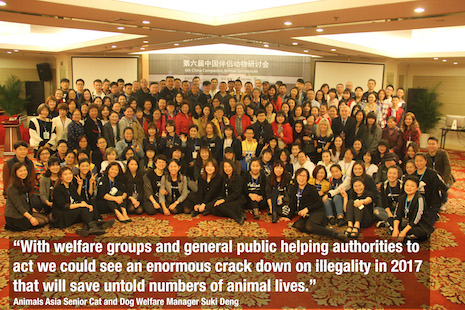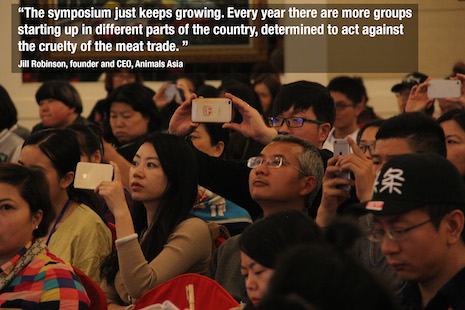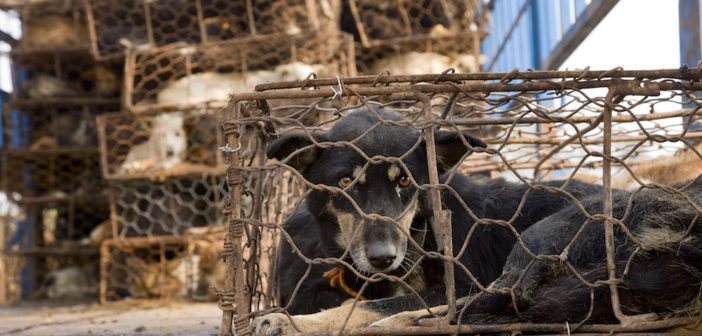Eating dog or cat meat in China is not illegal, but animal lovers say the industry is so steeped in criminality that existing laws can bring it down.
China’s animal charities are determined to highlight the criminal behaviour of dog and cat traffickers and meat traders in a bid to end the industry for good.
This was the main theme that came out of the recent China Companion Animal Symposium held in Chengdu between April 2 – 4. The event was attended by 150 representatives of animal protection groups, shelters and NGOs from around the country.
And while groups continue to push for legislation that specifically outlaws dog and cat meat eating, they are determined, in the meantime, to fight the trade with all the legal weapons at their disposal.
Up to 10 million dogs are believed to be slaughtered inhumanely in China every year for human consumption, media estimate. And while the practice may be legal, the industry is rife with illegality.

Most dogs which end up on the dinner plate are stolen pets or strays snatched from the street. Often they are poisoned and illegally transported across the country.
The animals being consumed have no proof of origin, have not been vaccinated and many of the restaurants selling them don’t have the required license.
Campaigners believe this is the industry’s Achilles’ heel. The industry simply isn’t financially viable on its present scale to operate legally, so it cuts corners at every stage.
And, animal lovers know, if they can ensure the law is upheld, dog and cat meat traders won’t be able to stay in business.
The three-day China Companion Animal Symposium, hosted by Ya Dong Consulting, a subsidiary of Animals Asia, brought groups from more than 50 cities in China together to discuss tactics and share experiences in how to end the dog meat trade, provide practical advice on shelter management and help grow their organisations to reach more people and help more animals.

Animals Asia’s Senior Cat and Dog Welfare Manager Suki Deng said:
“The symposium has become the main hub to discuss tactics for ending cat and dog meat eating in China. It is a chance for those of us fighting the industry to coordinate our efforts to save the most lives.
“The people taking part are incredibly passionate, determined and resourceful. They work 52 weeks a year to end the cruel trade by spreading awareness of the dark side of the industry and it’s this kind of domestic, grassroots activism that will result in real change for China’s cats and dogs.”
The Companion Animal Symposium started in 2006 under the management of Animals Asia and Humane Society International.
Animals Asia’s Founder and CEO, Jill Robinson MBE said:
“The symposium just keeps growing. Every year there are more groups starting up in different parts of the country, determined to act against the cruelty of the meat trade. These small groups make a huge difference on the ground, but they need support. The symposium allows them to share experiences, learn how best to conduct themselves and what programmes can be effective.”
The scale of the illegality in the dog and cat meat supply chain was made clear by long-running and far-reaching Animals Asia investigations. The resulting reports, released in 2015, revealed no evidence of any large-scale meat dog breeding facilities with more than 100 animals on site in any of the areas surveyed.

Jill said:
“It took many years of investigations to reveal the true scale of the illegality in the dog meat trade, but now that we know how the traders are operating, we can help the authorities uphold China’s laws and squeeze the traders’ profits. That is ultimately what will make change.
“Cat and dog meat consumption is a minority activity that is not part of mainstream Chinese culture. Once it is no longer financially profitable it will shrink dramatically and ultimately cease to exist.
“Make no mistake, this dog and cat meat eating needs to be outlawed, but while we push for that we can also take on the traders and highlight their abuse of existing laws.”
Animals Asia has been informing local government departments of meat trade violations throughout 2016, having reported more than 1,000 restaurants in that year alone with significant numbers being closed as a result.
Suki said:
“Targeting the trade’s illegality and helping the authorities uphold China’s laws has proven more successful than we could have hoped. This year’s symposium has allowed us to share that experience with other groups to help bring the full weight of the law to bear on China’s cat and dog meat traders.
“With the welfare groups and the general public helping the authorities to act we could see an enormous crack down on illegality in 2017 that will save untold numbers of animal lives.”
Featured image: dog in cage at Yulin dog meat festival. Courtesy Animals Asia, CC BY-NC 2.0





